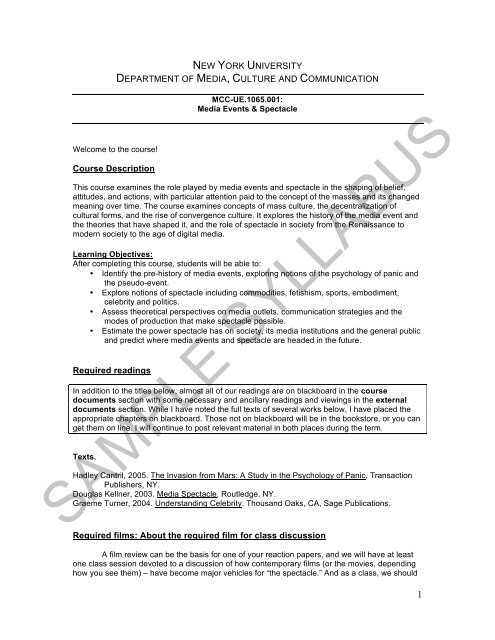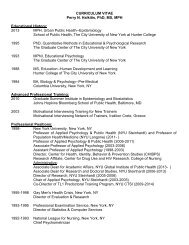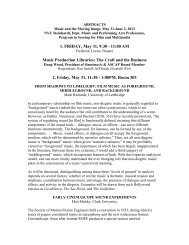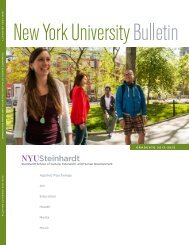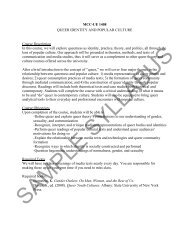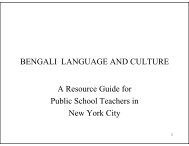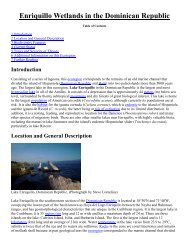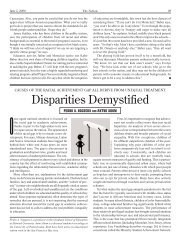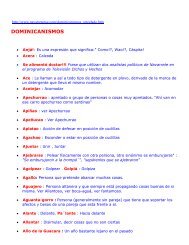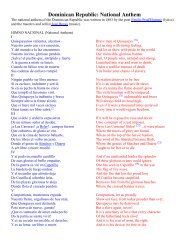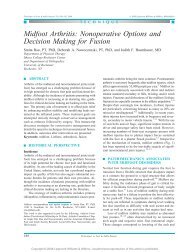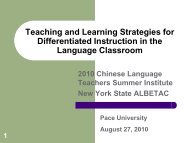new york university department of media - NYU Steinhardt School of ...
new york university department of media - NYU Steinhardt School of ...
new york university department of media - NYU Steinhardt School of ...
You also want an ePaper? Increase the reach of your titles
YUMPU automatically turns print PDFs into web optimized ePapers that Google loves.
Welcome to the course!<br />
Course Description<br />
NEW YORK UNIVERSITY<br />
DEPARTMENT OF MEDIA, CULTURE AND COMMUNICATION<br />
MCC-UE.1065.001:<br />
Media Events & Spectacle<br />
This course examines the role played by <strong>media</strong> events and spectacle in the shaping <strong>of</strong> belief,<br />
attitudes, and actions, with particular attention paid to the concept <strong>of</strong> the masses and its changed<br />
meaning over time. The course examines concepts <strong>of</strong> mass culture, the decentralization <strong>of</strong><br />
cultural forms, and the rise <strong>of</strong> convergence culture. It explores the history <strong>of</strong> the <strong>media</strong> event and<br />
the theories that have shaped it, and the role <strong>of</strong> spectacle in society from the Renaissance to<br />
modern society to the age <strong>of</strong> digital <strong>media</strong>.<br />
Learning Objectives:<br />
After completing this course, students will be able to:<br />
• Identify the pre-history <strong>of</strong> <strong>media</strong> events, exploring notions <strong>of</strong> the psychology <strong>of</strong> panic and<br />
the pseudo-event.<br />
• Explore notions <strong>of</strong> spectacle including commodities, fetishism, sports, embodiment,<br />
celebrity and politics.<br />
• Assess theoretical perspectives on <strong>media</strong> outlets, communication strategies and the<br />
modes <strong>of</strong> production that make spectacle possible.<br />
• Estimate the power spectacle has on society, its <strong>media</strong> institutions and the general public<br />
and predict where <strong>media</strong> events and spectacle are headed in the future.<br />
Required readings<br />
In addition to the titles below, almost all <strong>of</strong> our readings are on blackboard in the course<br />
documents section with some necessary and ancillary readings and viewings in the external<br />
documents section. While I have noted the full texts <strong>of</strong> several works below, I have placed the<br />
appropriate chapters on blackboard. Those not on blackboard will be in the bookstore, or you can<br />
get them on line. I will continue to post relevant material in both places during the term.<br />
Texts.<br />
Hadley Cantril, 2005. The Invasion from Mars: A Study in the Psychology <strong>of</strong> Panic, Transaction<br />
Publishers, NY.<br />
Douglas Kellner, 2003. Media Spectacle, Routledge, NY.<br />
Graeme Turner, 2004. Understanding Celebrity. Thousand Oaks, CA, Sage Publications.<br />
SAMPLE SYLLABUS<br />
Required films: About the required film for class discussion<br />
A film review can be the basis for one <strong>of</strong> your reaction papers, and we will have at least<br />
one class session devoted to a discussion <strong>of</strong> how contemporary films (or the movies, depending<br />
how you see them) – have become major vehicles for “the spectacle.” And as a class, we should<br />
1
choose a particular film or perhaps a series <strong>of</strong> films that we can discuss and relate to the major<br />
ideas <strong>of</strong> the course. This medium is in a transitional state in terms <strong>of</strong> its status in American<br />
culture. Where and how we experience these cultural artifacts – their conditions <strong>of</strong> attendance –<br />
seems to have changed the standing <strong>of</strong> film in our culture. Of course, the Academy Awards is one<br />
<strong>media</strong> event (technically, a pseudo event) we intend to discuss, because this <strong>media</strong> event is an<br />
important aspect <strong>of</strong> the contemporary spectacle culture – the star system, part <strong>of</strong> the celebrity<br />
culture business, the narratives they choose to tell, and how they tell them, should all be part <strong>of</strong><br />
our discussion.<br />
Course Requirements<br />
Students need to paginate their papers and use a consistent documentation format. Papers<br />
will be evaluated with a concern for form and content. Late papers will be accepted and read;<br />
however, I cannot promise a written evaluation or comments. Late papers will, <strong>of</strong> course, be<br />
penalized. The specific guidelines for the class presentations are TBA, but see below for general<br />
guidelines. Rubrics will be provided and posted on blackboard.<br />
1. A brief two-three page intellectual biography: what books or other <strong>media</strong><br />
products (music or films) and interests have helped form your aesthetic taste? This<br />
is a “reflective” essay on your part, in which you introduce/contemplate the<br />
intellectual and aesthetic you. For example, what films, books, paintings, music et al<br />
do you like or have liked, or have seemed to play an important role in your life and<br />
why do you think that’s the case? Not graded or evaluated, although read with<br />
commentary as a kind <strong>of</strong> informal introduction. If you have already been in one <strong>of</strong> my<br />
classes, and have done this assignment, you may opt out <strong>of</strong> this one. 0% <strong>of</strong> final<br />
grade.<br />
2. Midterm, 25% <strong>of</strong> final grade. This paper constitutes a “midterm,” and is due<br />
session # 8.<br />
3. Two reaction papers: one reaction paper should be written in the first half <strong>of</strong> the<br />
course and the second one in the latter half. One reaction paper can be a film review<br />
if you like. The other can be a reaction to a class or a series <strong>of</strong> classes. As to the<br />
content <strong>of</strong> your reaction: this is not a commentary on how the class was taught, but<br />
on the content <strong>of</strong> the class discussion. Choose a class session or a series <strong>of</strong> class<br />
sessions, that provokes some thought on your part – and advance the discussion, or<br />
question the discussion. You might want to suggest what question or questions you<br />
think the discussion answered and what question or questions you think the<br />
discussion did not come to grips with. Due anytime during the semester, but as<br />
noted, it would be more beneficial if the reaction paper was written and<br />
submitted close to the class or classes under discussion. Four – five pages for<br />
each reaction paper would be average. 20% <strong>of</strong> final grade.<br />
SAMPLE SYLLABUS<br />
4. Class presentations, discussions and attendance. Regular attendance and<br />
thoughtful and intelligent participation in class discussions are part <strong>of</strong> your overall<br />
evaluation. Because <strong>of</strong> our class size students will have the opportunity to complete<br />
2
at least one presentation – those who do more than one are exempt from one <strong>of</strong> the<br />
two class reaction papers. We will discuss during our first session. As for the class,<br />
please respect your fellow students and keep lateness to a minimum. Also, leaving<br />
the class periodically should be curtailed; such actions tend to disrupt student and<br />
instructor concentration, and become problematic when a student is doing a<br />
presentation. We also want to maintain punctual beginnings and endings. Two<br />
absences are allowed before your grade is affected. Students will be asked to make<br />
several short, concise presentations on chapters <strong>of</strong> the required texts or assigned<br />
essays or films. Please note that these presentations are to help create an<br />
atmosphere for class discussion not for the simple regurgitation <strong>of</strong> the article<br />
or chapter. Please take the concept <strong>of</strong> “presentation and discussion” literally. For<br />
example, if a student were to make a presentation, say, on the Boorstin chapters, he<br />
would briefly explain or review aspects <strong>of</strong> the pseudo-event from the text and then<br />
provide examples from the <strong>media</strong>. The presenter is urged to include the class in a<br />
discussion <strong>of</strong> the material. And while I will be evaluating the student’s presentation,<br />
the class – your listening and contributions – are also part <strong>of</strong> the evaluation process.<br />
More details to be discussed later. 25% <strong>of</strong> the final grade.<br />
5. Your final exam essay: This is a "take-home" essay exam. For this project consider<br />
our units <strong>of</strong> study from the second half <strong>of</strong> the semester and develop a paper from 10-<br />
12 pages on a contemporary spectacle <strong>of</strong> your own choosing. During the semester I<br />
will provide numerous examples for you to use as models for this assignment. Topics<br />
could include contemporary politics to various forms <strong>of</strong> popular entertainment. As<br />
you develop your project, think <strong>of</strong> ways this essay could become part <strong>of</strong> conference<br />
panel or a journal article. The chapter from Chris Hedges’ book, Empire <strong>of</strong> Illusion<br />
that we discuss during the term can serve as a model, although in his chapter he<br />
takes on way too many contemporary <strong>media</strong> artifacts. Write a unified essay, doublespaced<br />
and paginated, leaving some margin room for my comments. A proposal or<br />
an outline somewhere towards the 3/4 semester mark would be helpful to you and<br />
me – and the basis for a discussion/meeting between you and me. Approximately ten<br />
to twelve would be average. 30% <strong>of</strong> the final grade.<br />
6. Please note: students who make a second presentation either with a colleague<br />
or by themselves can have a second reaction paper waived.<br />
Evaluation Rubric<br />
A= Excellent<br />
This work is comprehensive and detailed, integrating themes and concepts from<br />
discussions, lectures and readings. Writing is clear, analytical and organized.<br />
Arguments <strong>of</strong>fer specific examples and concisely evaluate evidence. Students who earn<br />
this grade are prepared for class, synthesize course materials and contribute insightfully.<br />
SAMPLE SYLLABUS<br />
B=Good<br />
This work is complete and accurate, <strong>of</strong>fering insights at general level <strong>of</strong> understanding.<br />
Writing is clear, uses examples properly and tends toward broad analysis. Classroom<br />
participation is consistent and thoughtful.<br />
C=Average<br />
3
This work is correct but is largely descriptive, lacking analysis. Writing is vague and at<br />
times tangential. Arguments are unorganized, without specific examples or analysis.<br />
Classroom participation is inarticulate.<br />
D= Unsatisfactory<br />
This work is incomplete, and evidences little understanding <strong>of</strong> the readings or<br />
discussions. Arguments demonstrate inattention to detail, misunderstand course<br />
material and overlook significant themes. Classroom participation is spotty, unprepared<br />
and <strong>of</strong>f topic.<br />
F=Failed<br />
This grade indicates a failure to participate and/or incomplete assignments<br />
A = 94-100<br />
A- = 90-93<br />
B+ = 87-89<br />
B = 84-86<br />
B- = 80-83<br />
C+ = 77-79<br />
C = 74-76<br />
C- = 70-73<br />
D+ = 65-69<br />
D = 60-64<br />
F = 0-59<br />
Course Policies<br />
Absences and Lateness<br />
More than two unexcused absences will automatically result in a lower grade. Chronic<br />
lateness will also be reflected in your evaluation <strong>of</strong> participation. Regardless <strong>of</strong> the<br />
reason for your absence you will be responsible for any missed work. Travel<br />
arrangements do not constitute a valid excuse for rescheduling exams. There are no<br />
extra credit assignments for this class.<br />
Format<br />
Please type and double-space your written work. Typing improves the clarity and<br />
readability <strong>of</strong> your work and double-spacing allows room for me to comment. Please<br />
also number and staple multiple pages. You are free to use your preferred citation style.<br />
Please use it consistently throughout your writing. If sending a document electronically,<br />
please name the file in the following format Yourlastname Coursenumber<br />
Assignment1.doc<br />
Grade Appeals<br />
Please allow two days to pass before you submit a grade appeal. This gives you time to<br />
reflect on my assessment. If you still want to appeal your grade, please submit a short<br />
but considered paragraph detailing your concerns. Based on this paragraph I will review<br />
the question and either augment your grade or refine my explanation for the lost points.<br />
SAMPLE SYLLABUS<br />
4
General Decorum<br />
Slipping in late or leaving early, sleeping, text messaging, surfing the Internet, doing<br />
homework in class, eating, etc. are distracting and disrespectful to all participants in the<br />
course.<br />
Academic Dishonesty and Plagiarism<br />
http://steinhardt.nyu.edu/policies/academic_integrity<br />
The relationship between students and faculty is the keystone <strong>of</strong> the educational<br />
experience at New York University in the <strong>Steinhardt</strong> <strong>School</strong> <strong>of</strong> Culture, Education, and<br />
Human Development. This relationship takes an honor code for granted and mutual<br />
trust, respect, and responsibility as foundational requirements. Thus, how you learn is as<br />
important as what you learn. A <strong>university</strong> education aims not only to produce high-quality<br />
scholars, but to also cultivate honorable citizens.<br />
Academic integrity is the guiding principle for all that you do, from taking exams to<br />
making oral presentations to writing term papers. It requires that you recognize and<br />
acknowledge information derived from others and take credit only for ideas and work<br />
that are yours.<br />
You violate the principle <strong>of</strong> academic integrity when you<br />
• cheat on an exam,<br />
• submit the same work for two different courses without prior permission from your<br />
pr<strong>of</strong>essors,<br />
• receive help on a takehome examination that calls for independent work, or<br />
• plagiarize.<br />
Plagiarism, one <strong>of</strong> the gravest forms <strong>of</strong> academic dishonesty in <strong>university</strong> life, whether<br />
intended or not, is academic fraud. In a community <strong>of</strong> scholars, whose members are<br />
teaching, learning, and discovering knowledge, plagiarism cannot be tolerated.<br />
Plagiarism is failure to properly assign authorship to a paper, a document, an oral<br />
presentation, a musical score, and/or other materials that are not your original work. You<br />
plagiarize when, without proper attribution, you do any <strong>of</strong> the following:<br />
• copy verbatim from a book, an article, or other <strong>media</strong>;<br />
• download documents from the Internet;<br />
• purchase documents;<br />
• report from other’s oral work;<br />
• paraphrase or restate someone else’s facts, analysis, and/or conclusions; or<br />
• copy directly from a classmate or allow a classmate to copy from you.<br />
Your pr<strong>of</strong>essors are responsible for helping you to understand other people's ideas, to<br />
use resources and conscientiously acknowledge them, and to develop and clarify your<br />
own thinking. You should know what constitutes good and honest scholarship, style<br />
guide preferences, and formats for assignments for each <strong>of</strong> your courses. Consult your<br />
pr<strong>of</strong>essors for help with problems related to fulfilling course assignments, including<br />
questions related to attribution <strong>of</strong> sources.<br />
Through reading, writing, and discussion, you will undoubtedly acquire ideas from<br />
others, and exchange ideas and opinions with others, including your classmates and<br />
pr<strong>of</strong>essors. You will be expected, and <strong>of</strong>ten required, to build your own work on that <strong>of</strong><br />
other people. In so doing, you are expected to credit those sources that have contributed<br />
to the development <strong>of</strong> your ideas.<br />
SAMPLE SYLLABUS<br />
5
Avoiding Academic Dishonesty<br />
• Organize your time appropriately to avoid undue pressure, and acquire good<br />
study habits, including note taking.<br />
• Learn proper forms <strong>of</strong> citation. Always check with your pr<strong>of</strong>essors <strong>of</strong> record for<br />
their preferred style guides. Directly copied material must always be in quotes;<br />
paraphrased material must be acknowledged; even ideas and organization<br />
derived from your own previous work or another's work need to be<br />
acknowledged.<br />
• Always pro<strong>of</strong>read your finished work to be sure that quotation marks, footnotes<br />
and other references were not inadvertently omitted. Know the source <strong>of</strong> each<br />
citation.<br />
• Do not submit the same work for more than one class without first obtaining the<br />
permission <strong>of</strong> both pr<strong>of</strong>essors even if you believe that work you have already<br />
completed satisfies the requirements <strong>of</strong> another assignment.<br />
• Save your notes and drafts <strong>of</strong> your papers as evidence <strong>of</strong> your original work.<br />
Disciplinary Sanctions<br />
When a pr<strong>of</strong>essor suspects cheating, plagiarism, and/or other forms <strong>of</strong> academic<br />
dishonesty, appropriate disciplinary action may be taken following the <strong>department</strong><br />
procedure or through referral to the Committee on Student Discipline.<br />
Student Resources<br />
• Students with physical or learning disabilities are required to register with the<br />
Moses Center for Students with Disabilities, 726 Broadway, 2nd Floor, (212-998-<br />
4980) and are required to present a letter from the Center to the instructor at the<br />
start <strong>of</strong> the semester in order to be considered for appropriate accommodation.<br />
• Writing Center: 269 Mercer Street, Room 233. Schedule an appointment online<br />
at www.rich15.com/nyu/ or just walk-in.<br />
SAMPLE SYLLABUS<br />
6
Class schedule<br />
Date Ses Topic Readings<br />
1. Introduction: the big picture <strong>of</strong> <strong>media</strong> events and spectacle Syllabus<br />
2. Lecture presentation: the pre-history <strong>of</strong> <strong>media</strong> events: The Cantril, from “The Invasion<br />
Invasion from Mars: a study in the Psychology <strong>of</strong> Panic. from Mars,” on blackboard.<br />
3. Lecture presentation: the pre-history <strong>of</strong> <strong>media</strong> events: The Cantril, from “The Invasion<br />
Invasion from Mars: a study in the Psychology <strong>of</strong> Panic.<br />
Screening sections from “’Invasion from Mars’ documentary.”<br />
from Mars,” on blackboard.<br />
4. Media events and spectacle: prehistory: Boorstin’s the pseudo Boorstin, from “The Image,”<br />
event.<br />
on blackboard.<br />
5. Media events and spectacle: prehistory: Boorstin’s the pseudo Dayan and Katz, from “Media<br />
event.<br />
Events,” on blackboard<br />
6. Media Culture and the triumph <strong>of</strong> the spectacle. Dayan and Katz, from “Media<br />
Events,” on blackboard.<br />
7. Media Culture and the triumph <strong>of</strong> the spectacle. Kellner, from “Media<br />
Spectacle,” on blackboard.<br />
8. The Spectacle <strong>of</strong> Commodities: American advertising. Mcluhan, from “The<br />
Mechanical Bride,” on<br />
blackboard;<br />
9. The Spectacle <strong>of</strong> Commodities: American Advertising. Williams, “The Magic<br />
System,” on blackboard.<br />
10. The Spectacle <strong>of</strong> Sports: the Super Bowl in American culture Appropriate readings on<br />
blackboard<br />
11. The Spectacle <strong>of</strong> Sports: the Super Bowl in American culture: Appropriate articles on<br />
the advertising.<br />
blackaboard.<br />
12. The Spectacle <strong>of</strong> the body: American pr<strong>of</strong>essional wrestling Barthes, Hedges,<br />
introduction. Both on<br />
blackboard.<br />
13. Class Review.<br />
14. Midterm (in class)<br />
15. The spectacle <strong>of</strong> celebrity. Boorstin, from “The Image,”<br />
on blackboard & Turner,<br />
Part1.<br />
16. The spectacle <strong>of</strong> celebrity. Turner, Part 2 and 3<br />
17. The spectacle <strong>of</strong> celebrity.<br />
18. The movie spectacle. Tryon, chap 1.<br />
19. The movie spectacle Tryon, chap. 3<br />
20 The movie spectacle: the academy awards Haastrup, on blackboard.<br />
21. The spectacle <strong>of</strong> democracy: presidential debates. All readings on blackboard. .<br />
22. The spectacle <strong>of</strong> democracy: presidential debates. All readings on blackboard.<br />
23. The spectacle <strong>of</strong> democracy: presidential debates. All readings on blackboard.<br />
24. The spectacle <strong>of</strong> democracy: presidential conventions. Lang, from Politics and<br />
Television Reviewed,” on<br />
blackboard.<br />
25. The spectacle <strong>of</strong> democracy: presidential conventions. Panagopoulos, on<br />
blackboard.<br />
26. Puncturing the political spectacle: <strong>new</strong> political talk television. Jones, from “Entertaining<br />
Politics,” chaps on<br />
blackboard.<br />
27. Puncturing the political spectacle: satire and dissent. Jones, from “Entertaining<br />
Politics,” chaps on<br />
blackboard.<br />
28. Puncturing the political spectacle: satire and dissent. Day, from “Satire and<br />
Dissent,” on blackboard.<br />
29. Final class session. All questions answered; all answers<br />
questioned. Final paper due.<br />
SAMPLE SYLLABUS<br />
7
Some Recommended Reading<br />
Many books and publications and articles have been useful in helping to develop this<br />
course known as “Media Events and Spectacle.” Here is a partial listing, sometimes with a brief<br />
commentary. These books would make welcome additions to your reading as well as your library.<br />
By the way, if you come across any interesting books in your intellectual travels that you think can<br />
help us understand our spectacle driven culture, feel free to bring it to my attention. Thanks, sjf.<br />
Auslander, Philip. 1999. Liveness: Performance in a Mediatized Culture. New York: Routledge.<br />
Boorstin, Daniel. 1987. The Image: A Guide to Pseudo-events in America. New York:<br />
Athenaeum. First published in 1961.<br />
Carey, James. 1988. Communication As Culture: Essays on Media and Society. While this whole<br />
book is recommended, chapter two “Mass Communication and Cultural Studies” is the essay that<br />
best serves our study <strong>of</strong> the “mass mind.”<br />
Couldry, Nick. 2003. “Rethinking Media Events,” in Media Rituals: A Critical Approach. New York:<br />
Routledge.<br />
Curran, James. 1982. "Communications, Power and Social Order." In Gurevitch, M., Bennet, T.,<br />
et al (eds.). Culture, Society and the Media. New York: Methuen.<br />
Czitrom, Daniel. 1990. Media and the American Mind: From Morse to McLuhan. Chapel Hill, NC:<br />
University <strong>of</strong> North Carolina Press. This is a very valuable book: it contains three case studies <strong>of</strong><br />
<strong>media</strong> that helped bring about “the mass mind.” These include: the development <strong>of</strong> the telegraph,<br />
the rise <strong>of</strong> radio, and the evolution <strong>of</strong> the motion picture industry; along with these case studies is<br />
a remarkably lucid account <strong>of</strong> the growth <strong>of</strong> the philosophy <strong>of</strong> communications, from the “founding<br />
fathers” Charles Horton Cooley, John Dewey and Robert E. Park to Marshall McLuhan and<br />
Harold A. Innis.<br />
Dayan, Daniel and Katz, Elihu. 1992. Media Events: The Live Broadcasting <strong>of</strong> History.<br />
Cambridge: Harvard University Press.<br />
Brantlinger, Patrick. 1983. Bread and Circuses: Theories <strong>of</strong> Mass Culture as Social Decay. This is<br />
perhaps one <strong>of</strong> the finest compilations <strong>of</strong> the history <strong>of</strong> mass culture debate. Brantlinger traces<br />
the debate from the ancient Greeks to twentieth century discussions <strong>of</strong> Post-Modernism.<br />
Caldwell, John Thornton. 1995. Televisuality: Style, Crisis and Authority in American Television.<br />
New Brunswick, NJ: Rutgers University Press.<br />
Ewen, Stuart. 1988. All Consuming Images: The Politics <strong>of</strong> Style in Contemporary Culture.<br />
You will never talk or think about “style” in the same way again.<br />
__________. 1996. PR!: A Social History <strong>of</strong> Spin. As you might expect, this is a historical look at<br />
the development <strong>of</strong> spin. It contains a remarkable case study on Edward Bernays, the “father” <strong>of</strong><br />
public relations and master <strong>of</strong> the pseudo-event.<br />
SAMPLE SYLLABUS<br />
The New York Times Magazine. "Heroine Worship: Inventing an Identity in the Age <strong>of</strong><br />
Female Icons. “A Special Issue." November 24, 1996. An interesting look at contemporary female<br />
imagery.<br />
Eagleton, Terry. The Idea <strong>of</strong> Culture. 2000. London: Blackwell Publishers.<br />
Faludi, Susan. "The Masculine Mystique." Esquire. 126:6, December, 1996. A feminist author<br />
8
interviews an alpha male, Sylvester Stallone, on the meaning and changing <strong>of</strong> contemporary<br />
masculinity. One <strong>of</strong> the more interesting pseudo-events <strong>of</strong> the 1990s.<br />
Fiske, John. 1996. Media Matters: Politics: Everyday Culture and Political Change. Minneapolis:<br />
University <strong>of</strong> Minnesota Press.<br />
Hall, Ann C. and Mardia J. Bishop, eds. 2007. Pop-Porn: Pornography in American Culture.<br />
Praeger, Westport CT.<br />
Hall, Stuart. 1998. Ed. Representation: Cultural Representations and Cultural Practices.<br />
Thousand Oaks, CA: Sage Publications [In Association with The Open University].<br />
Kellner, Douglas. 1995. Media Culture: Cultural Studies, Identity and Politics Between the Modern<br />
and the Postmodern. London: Routledge.<br />
Levine, Lawrence W. 1984. “William Shakespeare and the American People: A Study in Cultural<br />
Transformation” in Rethinking Popular Culture: Contemporary Perspectives in Cultural<br />
Studies. Eds. Chandra Mukerji and Michael Schudson. Berkeley, CA: University <strong>of</strong><br />
California Press, 1991.<br />
________________. 1988. Highbrow/Lowbrow: The Emergence <strong>of</strong> Cultural Hierarchy in America.<br />
Cambridge, MA: Harvard University Press.<br />
Marc, David. 1997. Comic Visions: Television Comedy and American Culture. 2 nd edition.<br />
Malden MA: Blackwell Publishers.<br />
Marcus, Greil. 1997. Invisible Republic: Bob Dylan's Basement Tapes. A subterranean<br />
history <strong>of</strong> an important aspect <strong>of</strong> modern music. New York: Henry Holt.<br />
Miller, Mark Crispin. 1992. (Ed.). Seeing Through Movies. New York: Pantheon Books. What is <strong>of</strong><br />
particular interest in this fine collection <strong>of</strong> essays is Miller's film essay "End <strong>of</strong> Story” which<br />
discusses the pernicious role <strong>of</strong> advertising and modern film narrative.<br />
McLuhan, M. Understanding Media: The Extensions <strong>of</strong> Man. Cambridge MA : The MIT<br />
Press, 1964. An important chapter for this course is chapter 21, "Government by Newsleak."<br />
Mukerji, Chandra and Michael Schudson, Eds.1991. Rethinking Popular Culture: Contemporary<br />
Perspectives in Cultural Studies. Berkeley: University <strong>of</strong> California Press.<br />
Murray, Susan and Laurie Ouellette. 2004. Reality TV: Remaking Television Culture. New York:<br />
New York University Press.<br />
Real, Michael R. 1996. “Historical/Ethical Interpretation: Reconstructing the Quiz Show Scandal,”<br />
in Exploring Media Culture: A Guide. Thousand Oaks, CA: Sage Publications.<br />
Rothenberg, Randall. "The Age <strong>of</strong> Spin." Esquire. 126:6, December, 1996. This is a reworking <strong>of</strong><br />
Ewen’s ideas in PR, along with a “story interview” with Stuart Ewen.<br />
SAMPLE SYLLABUS<br />
Schudson, Michael. Discovering the News: A Social History <strong>of</strong> American News. New York: Basic<br />
Books, 1978. This is a very readable and brief history <strong>of</strong> American <strong>new</strong>spapers, an important<br />
“distributor” <strong>of</strong> pseudo-events. .<br />
Simon, Richard. 1999. Trash Culture: Popular Culture and the Great Tradition. Berkeley, CA:<br />
University <strong>of</strong> California Press.<br />
9
Storey, John. 1998. An Introduction to Cultural Theory and Popular Culture. 3 nd edition. Athens,<br />
GA: University <strong>of</strong> Georgia Press.<br />
Snyder, Robert W. 1994. "The Vaudeville Circuit: A Prehistory <strong>of</strong> the Mass Audience." in James<br />
S. Ettema and D. Charles Whitney (Eds.) 1994. Audiencemaking: How the Media Create the<br />
Audience. Thousand Oaks, CA: Sage Publications.<br />
Stephens, Mitchell. A History <strong>of</strong> News: From the Drum to the Satellite. New York: Penguin Books,<br />
1988. There is a second edition <strong>of</strong> this book, a very valuable examination <strong>of</strong> the changing nature<br />
<strong>of</strong> "<strong>new</strong>s" as societies move from oral, through print and electronic technologies.<br />
Twitchell, James B. 1992. Carnival Culture: The Trashing <strong>of</strong> Taste in America. New York:<br />
Columbia University Press.<br />
Journals on cultural theory and popular culture: the following journals provide current thinking on<br />
“mass mind” issues.<br />
Critical Studies in Mass Communication Critical Quarterly<br />
Cultural Studies<br />
Feminist Review<br />
European Journal <strong>of</strong> Communication<br />
International Journal <strong>of</strong> Cultural and Media<br />
Journal <strong>of</strong> Popular Culture<br />
Literature and History<br />
Media, Culture and Society<br />
New Formation<br />
Screen<br />
Southern Review<br />
Textual Practice<br />
Theory, Culture and Society<br />
Women: a cultural review<br />
Women’s Studies<br />
SAMPLE SYLLABUS<br />
10


